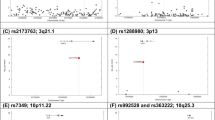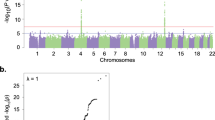Abstract
Basic information on the association between lifestyle factors and candidate genes is valuable for genetic–environmental study. We screened the association of habitual smoking or drinking with polymorphism in 40 candidate genes for a total of 153 single nucleotide polymorphisms (SNPs) using a sample of 339 middle-aged, randomly selected Japanese men. Smoking and drinking statuses were elicited during questionnaire-based interviews. Genes were selected based on their possible involvement in genetic–environmental, life-style interactions and constitute the genes expressing xenobiotic metabolism enzymes, DNA repair enzymes, and other stress-related proteins. The P values of odds ratios to habitual smoking for CYP17A1, ESR1, EPHX1, GSTT2, ALDH2, NOS2A, OGG1, and SLC6A4 and those of odds ratios to habitual drinking for CYP1B1, ESR1, HSD17B3, GSTM3, COMT, ADH1C, ALDH2, NOS3, and NUDT1 were under 0.05. These variables were included in a stepwise logistic analysis in order to develop a predictive model for smoking or drinking behavior. In the final model, the only significant variables selected for smoking were OGG1, SLC6A4, EPHX1, ESR1, and CYP17A1, and for drinking, ALDH2 and NUDT1. The findings of the present study suggest that polymorphism in associated candidate genes plays a role in the habitual use of tobacco and alcohol among Japanese men.
Similar content being viewed by others
Log in or create a free account to read this content
Gain free access to this article, as well as selected content from this journal and more on nature.com
or
References
Carmelli D, Swan GE, Robinette D, Fabsitz R (1992) Genetic influence on smoking–a study of male twins. N Engl J Med 327:829–833
Comings DE, Muhleman D, Johnson P, MacMurray JP (1999) Potential role of the estrogen receptor gene (ESR1) in anxiety. Mol Psychiatry 4:374–377
Eriksson CJ (2001) The role of acetaldehyde in the actions of alcohol (update 2000). Alcohol Clin Exp Res 25:15S-32S
Goedde HW, Agarwal DP, Fritze G, Meier-Tackmann D, Singh S, Beckmann G, Bhatia K, Chen LZ, Fang B, Lisker R et al (1992) Distribution of ADH2 and ALDH2 genotypes in different populations. Hum Genet 88:344–346
Goode EL, Ulrich CM, Potter JD (2002) Polymorphisms in DNA repair genes and associations with cancer risk. Cancer Epidemiol Biomarkers Prev 11:1513–1530
Heath AC, Meyer J, Jardine R, Martin NG (1991) The inheritance of alcohol consumption patterns in a general population twin sample: II. Determinants of consumption frequency and quantity consumed. J Stud Alcohol 52:425–433
Hopfer CJ, Stallings MC, Hewitt JK (2001) Common genetic and environmental vulnerability for alcohol and tobacco use in a volunteer sample of older female twins. J Stud Alcohol 62:717–723
Hussain SP, Hofseth LJ, Harris CC (2001) Tumor suppressor genes: at the crossroads of molecular carcinogenesis, molecular epidemiology and human risk assessment. Lung Cancer 34 (Suppl 2):S7–S15
Ishikawa H, Ohtsuki T, Ishiguro H, Yamakawa-Kobayashi K, Endo K, Lin YL, Yanagi H, Tsuchiya S, Kawata K, Hamaguchi H, Arinami T (1999) Association between serotonin transporter gene polymorphism and smoking among Japanese males. Cancer Epidemiol Biomarkers Prev 8:831–833
Le Marchand L, Donlon T, Lum-Jones A, Seifried A, Wilkens LR (2002) Association of the hOGG1 Ser326Cys polymorphism with lung cancer risk. Cancer Epidemiol Biomarkers Prev 11:409–412
Lerman C, Shields PG, Audrain J, Main D, Cobb B, Boyd NR, Caporaso N (1998) The role of the serotonin transporter gene in cigarette smoking. Cancer Epidemiol Biomarkers Prev 7:253–255
McGue M, Iacono WG, Legrand LN, Elkins I (2001) Origins and consequences of age at first drink. II. Familial risk and heritability. Alcohol Clin Exp Res 25:1166–1173
Munaka M, Kohshi K, Kawamoto T, Takasawa S, Nagata N, Itoh H, Oda S, Katoh T (2003) Genetic polymorphisms of tobacco- and alcohol-related metabolizing enzymes and the risk of hepatocellular carcinoma. J Cancer Res Clin Oncol 129:355–360
Muramatsu T, Wang ZC, Fang YR, Hu KB, Yan H, Yamada K, Higuchi S, Harada S, Kono H (1995) Alcohol and aldehyde dehydrogenase genotypes and drinking behavior of Chinese living in Shanghai. Hum Genet 96:151–154
Pianezza ML, Sellers EM, Tyndale RF (1998) Nicotine metabolism defect reduces smoking. Nature 393:750
Ross P, Hall L, Smirnov I, Haff L (1998) High level multiplex genotyping by MALDI-TOF mass spectrometry. Nat Biotechnol 16:1347–1351
Sabol SZ, Nelson ML, Fisher C, Gunzerath L, Brody CL, Hu S, Sirota LA, Marcus SE, Greenberg BD, Lucas FRt, Benjamin J, Murphy DL, Hamer DH (1999) A genetic association for cigarette smoking behavior. Health Psychol 18:7–13
Schlesselman JJ (1982) Case-control studies: design, conduct, analysis. Oxford University Press, New York
Shields PG, Lerman C, Audrain J, Bowman ED, Main D, Boyd NR, Caporaso NE (1998) Dopamine D4 receptors and the risk of cigarette smoking in African-Americans and Caucasians. Cancer Epidemiol Biomarkers Prev 7:453–458
Sugimura H, Wakai K, Genka K, Nagura K, Igarashi H, Nagayama K, Ohkawa A, Baba S, Morris BJ, Tsugane S, Ohno Y, Gao C, Li Z, Takezaki T, Tajima K, Iwamasa T (1998) Association of Ile462Val (Exon 7) polymorphism of cytochrome P450 IA1 with lung cancer in the Asian population: further evidence from a case-control study in Okinawa. Cancer Epidemiol Biomarkers Prev 7:413–417
Tsugane S, Gey F, Ichinowatari Y, Miyajima Y, Ishibashi T, Matsuishima S, Hirota Y, Inami T, Yamaguchi M, Karita K, Kabuto M, Takeshima Y, Todoriki H, Tsuda M, Akabane M, Furuichi Y, Hamada G, Watanabe S (1992a) Cross-sectional epidemiologic study for assessing cancer risks at the population level I. Study design and participation rate. J Epidemiol 2:75–81
Tsugane S, Gey F, Ichinowatari Y, Miyajima Y, Ishibashi T, Matsuishima S, Hirota Y, Inami T, Yamaguchi M, Karita K, Kabuto M, Takeshima Y, Todoriki H, Tsuda M, Akabane M, Furuichi Y, Hamada G, Watanabe S (1992b) Cross-sectional epidemiologic study for assesing cancer risks at the population level II. Baseline data and correlation analysis. J Epidemiol 2:83–89
Wu X, Hudmon KS, Detry MA, Chamberlain RM, Spitz MR (2000) D2 dopamine receptor gene polymorphisms among African-Americans and Mexican-Americans: a lung cancer case-control study. Cancer Epidemiol Biomarkers Prev 9:1021–1026
Yokoyama A, Omori T (2001) Alcohol and oropharyngolaryngeal and digestive tract cancer. Nihon Arukoru Yakubutsu Igakkai Zasshi 36:551–566
Yoshida K, Hamajima N, Kozaki K, Saito H, Maeno K, Sugiura T, Ookuma K, Takahashi T (2001) Association between the dopamine D2 receptor A2/A2 genotype and smoking behavior in the Japanese. Cancer Epidemiol Biomarkers Prev 10:403–405
Yoshimura K, Hanaoka T, Ohnami S, Kohno T, Liu Y, Yoshida T, Sakamoto H, Tsugane S (2003) Allele frequencies of single nucleotide polymorphisms (SNPs) in 40 candidate genes for gene-environment studies on cancer: data from population-based Japanese random samples. J Hum Genet 48:654–658
Acknowledgements
This study was supported mainly by the Program for Promotion of Fundamental Studies in Health Sciences of the Organization for Pharmaceutical Safety and Research, and the Grant-in-Aid for Cancer Research, and Risk Analysis Research on Food and Pharmaceuticals from the Japanese Ministry of Health, Labour and Welfare.
Author information
Authors and Affiliations
Corresponding author
Rights and permissions
About this article
Cite this article
Liu, Y., Yoshimura, K., Hanaoka, T. et al. Association of habitual smoking and drinking with single nucleotide polymorphism (SNP) in 40 candidate genes: data from random population-based Japanese samples. J Hum Genet 50, 62–68 (2005). https://doi.org/10.1007/s10038-004-0221-9
Received:
Accepted:
Published:
Issue date:
DOI: https://doi.org/10.1007/s10038-004-0221-9
Keywords
This article is cited by
-
Common and Unique Biological Pathways Associated with Smoking Initiation/Progression, Nicotine Dependence, and Smoking Cessation
Neuropsychopharmacology (2010)
-
Gene–environmental interaction regarding alcohol-metabolizing enzymes in the Japanese general population
Hypertension Research (2009)
-
Evaluating HapMap SNP data transferability in a large-scale genotyping project involving 175 cancer-associated genes
Human Genetics (2006)



